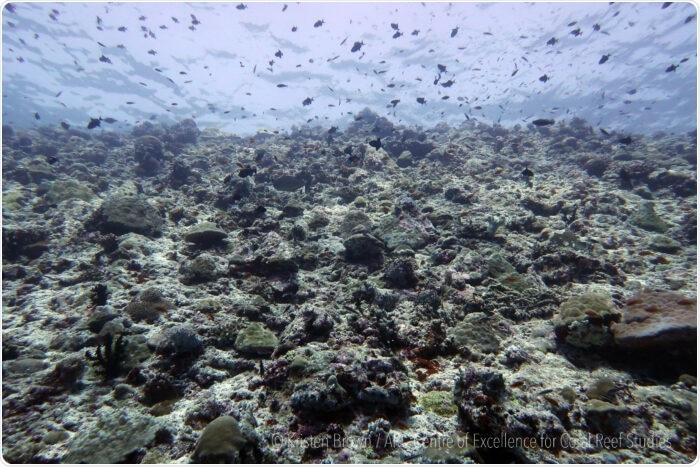According to a new study, the coastal protection presently provided by coral reefs will begin to deteriorate toward the end of the century, as the oceans acidify and the world becomes increasingly warm.

Reefs will struggle to keep up with the current trajectory of warming and ocean acidification. The impacts by the end of the century include “insidious and accelerated loss of coastal protection under unmitigated CO2 emissions.” Image Credit: Kristen Brown.
A research team, headed by Sophie Dove, an Associate Professor from the ARC Centre of Excellence for Coral Reef Studies at The University of Queensland (Coral CoE at UQ), studied the potential of coral reef ecosystems to maintain calcium carbonate deposits under the present forecasts of ocean acidification and warming.
Skeletons are composed of calcium carbonate, which melts under hot and acidic conditions. “Calcifiers” refers to marine animals that require calcium carbonate for their shells or skeletons. Skeletons are also found in hard corals, and they account for most of the 3D structure in coral reefs. It is this structure that helps protects the coasts—and also those dwelling on the coasts—from the effect of waves, storms, and floods. The coasts will “drown” without the coral reefs.
According to Associate Professor Dove, the quantity of calcium carbonate inside a coral reef ecosystem relies on the biomass of hard corals. However, it also relies on the mixed effect of acidification and warming on calcium carbonate structures, which were previously deposited. She added that the study results also indicate that the erosion rate will overtake the accretion rate on the majority of current coral reefs.
Today’s Great Barrier Reef has a 30% calcifier cover. If CO2 emissions aren’t curbed, by the end-of-century a 50% calcifier cover is required to counter the physical erosion they face from storms and wave impacts. In addition, more than 110% calcifier cover is needed to keep up with the minimal levels of sea-level rise.”
Sophie Dove, Associate Professor, ARC Centre of Excellence for Coral Reef Studies, University of Queensland
But according to Associate Professor Dove, both of these situations are highly improbable, because large amounts of hard corals perish under strong underwater heatwaves. Earlier studies have demonstrated that marine heatwaves will become chronic during the warmer months of an average year under unmitigated emissions of CO2 gas.
The study was recently published in the Communications Earth & Environment journal when the Great Barrier Reef was rated as “critical” by the IUCN World Heritage Outlook 3.
Associate Professor Dove and her group constructed experimental reefs that almost resembled those of shallow reef slopes located at Heron Island on the southern Great Barrier Reef. For 18 months, the team investigated the impacts of upcoming climate scenarios on the ecosystem.
“What we saw was the insidious and accelerated loss of coastal protection under unmitigated CO2 emissions,” stated Ove Hoegh-Guldberg, the co-author of the study and professor from Coral CoE at UQ.
Under current projections, reefs will not simply adapt. Chronic exposure to the combined impacts of ocean warming and acidification will weaken reefs. They won’t be able to re-build after disturbances such as cyclones, nor will they keep up with sea-level rise—possibly for thousands of years.”
Dr Kristen Brown, Study Co-Author, ARC Centre of Excellence for Coral Reef Studies, The University of Queensland
This indicates that several coastal regions, which are presently protected by calcareous coral reefs, will no longer be guarded, influencing coastal communities and infrastructure.
The combined impact of warming with the acidification of our oceans will see more than the collapse of ecosystems.”
Sophie Dove, Associate Professor, ARC Centre of Excellence for Coral Reef Studies, University of Queensland
Source:
Journal reference:
Dove, S. G., et al. (2020) Ocean warming and acidification uncouple calcification from calcifier biomass which accelerates coral reef decline. Communications Earth and Environment. doi.org/10.1038/s43247-020-00054-x.